Last week, I was speaking about the potential of the various languages within English for creating a new language for science. I think there’s something I should have explained, so let me get it out of the way. Without words for something, it doesn’t get developed into agricultural and scientific possibility. Here, for example, are some grapes grown for wine above my house…
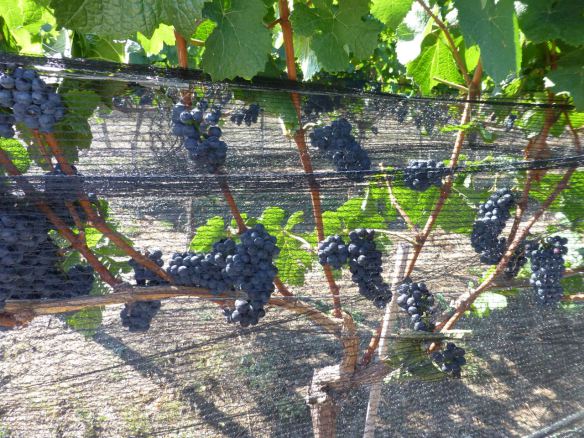 The image was made in September. They’re off the vine now and fermenting in a shed in Kelowna, to the south. Here’s another image from September, however, in which I wondered out loud what was going on. These are wild grapes…
The image was made in September. They’re off the vine now and fermenting in a shed in Kelowna, to the south. Here’s another image from September, however, in which I wondered out loud what was going on. These are wild grapes…
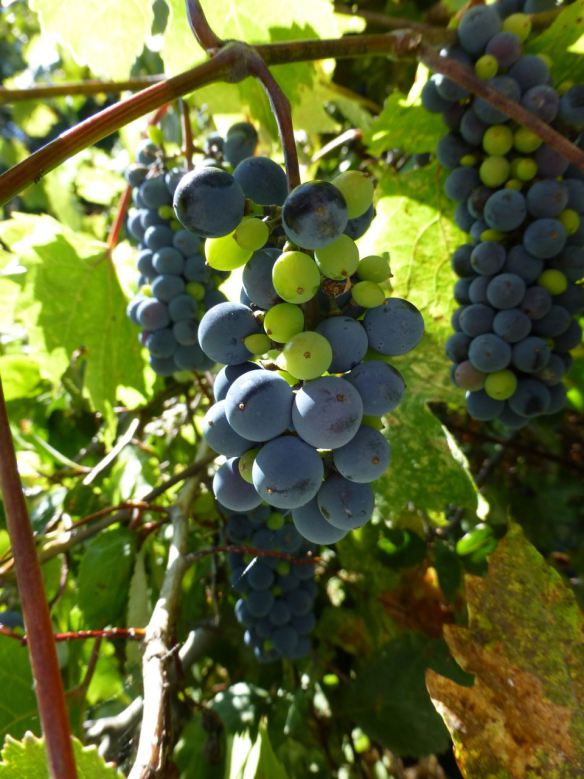 As you can see, they have a wide variety of maturities. What does it mean for wine? I wondered. What does it mean for the plant? There are no answers, because scientists are concerned about very practical issues around the story of wine-making and these, being wild grapes, are outside of that story. Or are they? Look at them now…
As you can see, they have a wide variety of maturities. What does it mean for wine? I wondered. What does it mean for the plant? There are no answers, because scientists are concerned about very practical issues around the story of wine-making and these, being wild grapes, are outside of that story. Or are they? Look at them now…
Not much left, is there. Oh, but there is. Let’s poke around in this canopy of vines on top of this black hawthorn tree…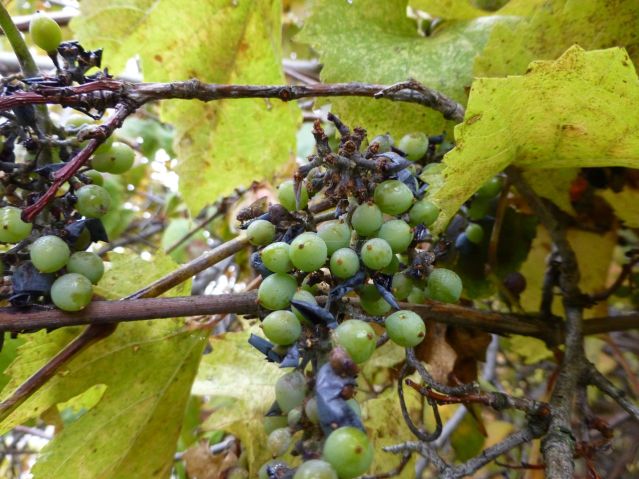 Yeah, the birds got the ripe grapes, leaving these green ones behind. They’re going to get through the winter in much this shape, I expect. There’s a lot of them, too…
Yeah, the birds got the ripe grapes, leaving these green ones behind. They’re going to get through the winter in much this shape, I expect. There’s a lot of them, too…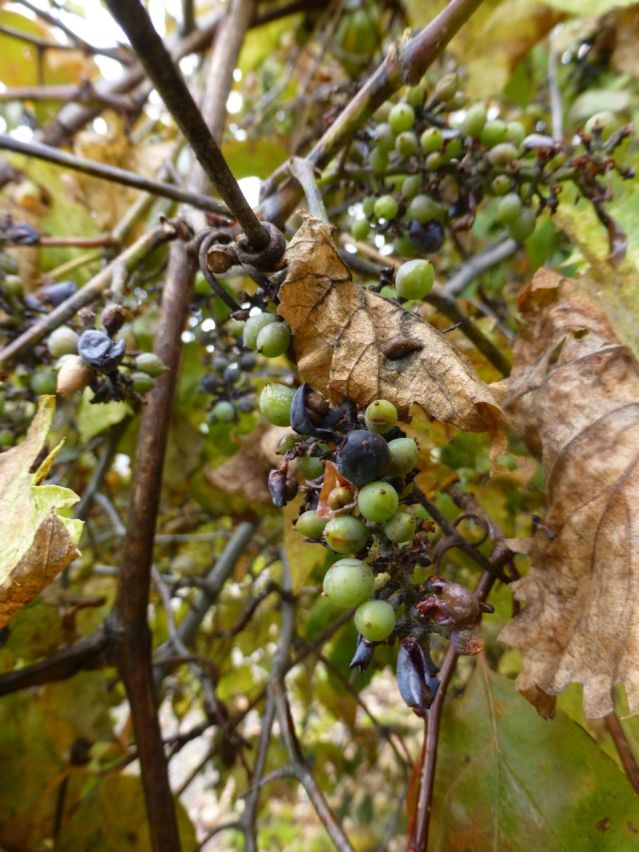 Now, earlier in the year, back in July, let’s say, these grapes would have been exactly this colour, and would have been nearly 100% citric acid. Then came the magic of transformation, the skins built up malic acid, and the fruits replaced their acid bit by bit with sugars, and out of that comes wine. This isn’t July, though. Now these grapes are only half as hard as they were back then, scarcely sour, and, well, look at them in the light …
Now, earlier in the year, back in July, let’s say, these grapes would have been exactly this colour, and would have been nearly 100% citric acid. Then came the magic of transformation, the skins built up malic acid, and the fruits replaced their acid bit by bit with sugars, and out of that comes wine. This isn’t July, though. Now these grapes are only half as hard as they were back then, scarcely sour, and, well, look at them in the light …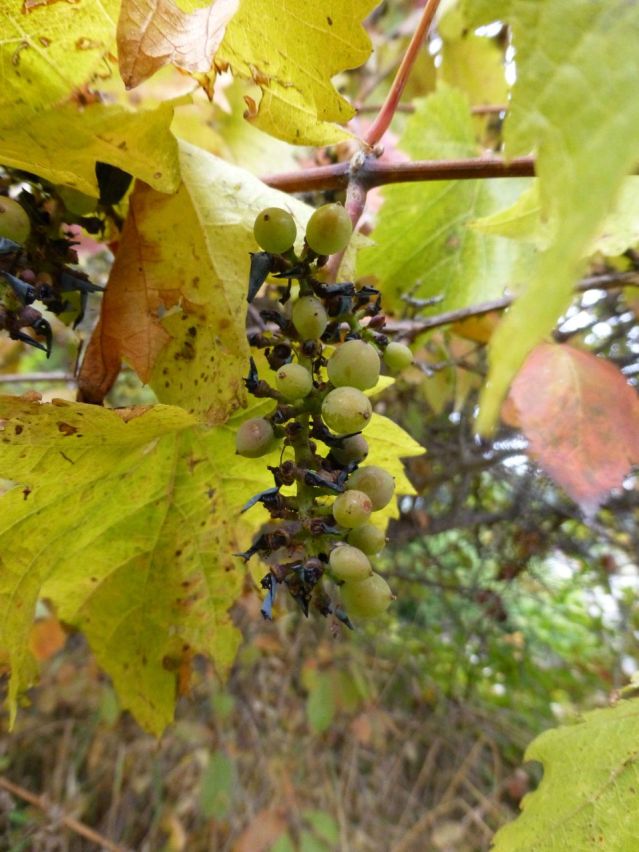 Beautiful, aren’t they. They’re scarcely sour, their seeds are mature, and they’re going through a complex process of maturity that is nothing like that which their sisters went through in July. Where will it lead? Well, for the moment, to a cool climate environment of slow maturation with little sunlight, in the shade, yet cleared of the competition of tight clusters.
Beautiful, aren’t they. They’re scarcely sour, their seeds are mature, and they’re going through a complex process of maturity that is nothing like that which their sisters went through in July. Where will it lead? Well, for the moment, to a cool climate environment of slow maturation with little sunlight, in the shade, yet cleared of the competition of tight clusters.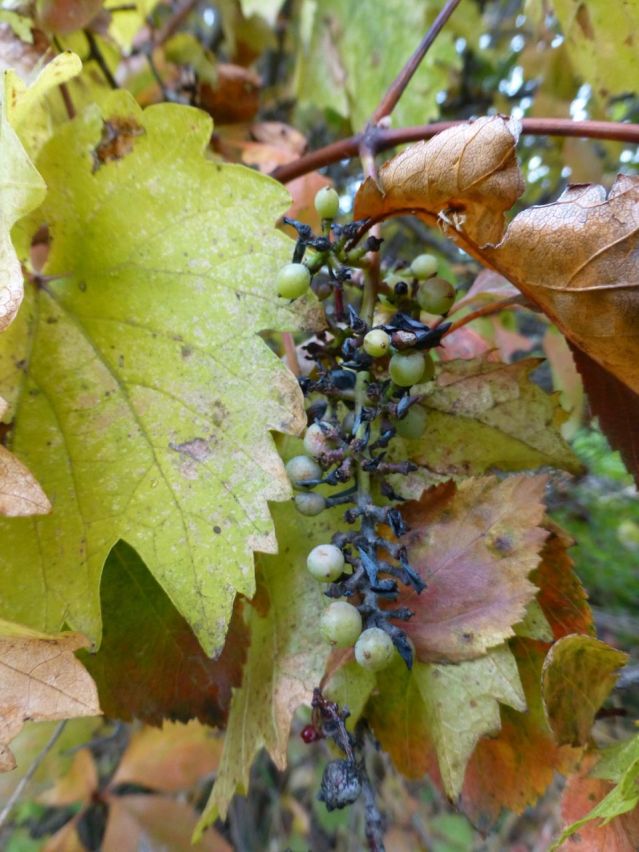 Some of those early purple grapes remain, and will live off of their sugars through the winter…
Some of those early purple grapes remain, and will live off of their sugars through the winter…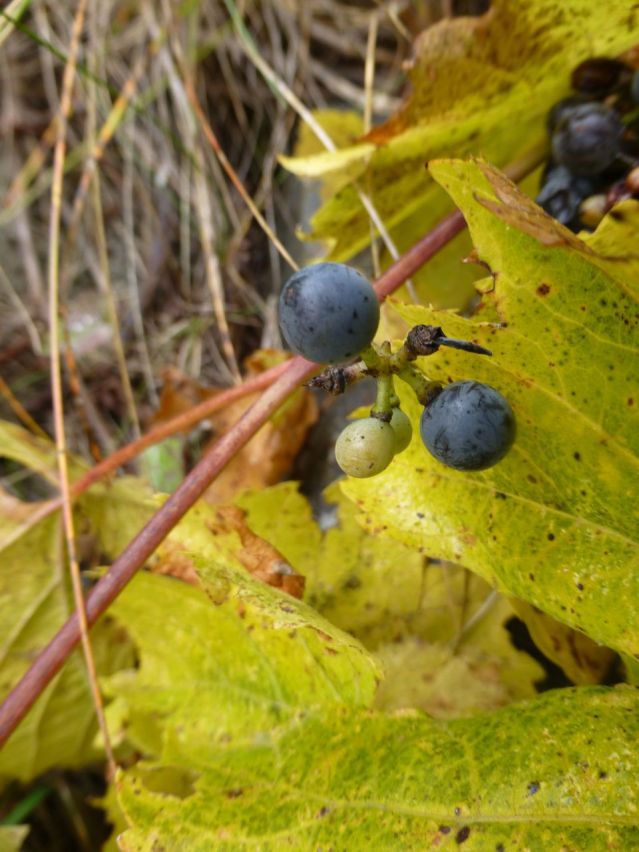 … just as these will live off of their acids. It’s like wine, actually. The best wines, the ones that keep the longest, have strong, complex acids, which they digest slowly over long periods of time, in the dark. Well, here it is, happening right on the vine. The point about language is, if fermentation is understood as a process that goes on in barrels, in the juice of dark berries picked out of the sunlight, the contribution of this other type of maturity is lost to the wine-making process. Similarly, if this wild grape plant is called a weed, it will be ignored, and if we’re using language of heat and sunlight to describe wine grapes, the blend of maturities within these grapes will be lost to the wine-making process. In short, we will be telling a story by making wine, but one far diminished from the one we could tell. I’m all for telling good stories.
… just as these will live off of their acids. It’s like wine, actually. The best wines, the ones that keep the longest, have strong, complex acids, which they digest slowly over long periods of time, in the dark. Well, here it is, happening right on the vine. The point about language is, if fermentation is understood as a process that goes on in barrels, in the juice of dark berries picked out of the sunlight, the contribution of this other type of maturity is lost to the wine-making process. Similarly, if this wild grape plant is called a weed, it will be ignored, and if we’re using language of heat and sunlight to describe wine grapes, the blend of maturities within these grapes will be lost to the wine-making process. In short, we will be telling a story by making wine, but one far diminished from the one we could tell. I’m all for telling good stories.
~
Tomorrow: details on what language can offer to science.
Categories: Nature Photography, Wine












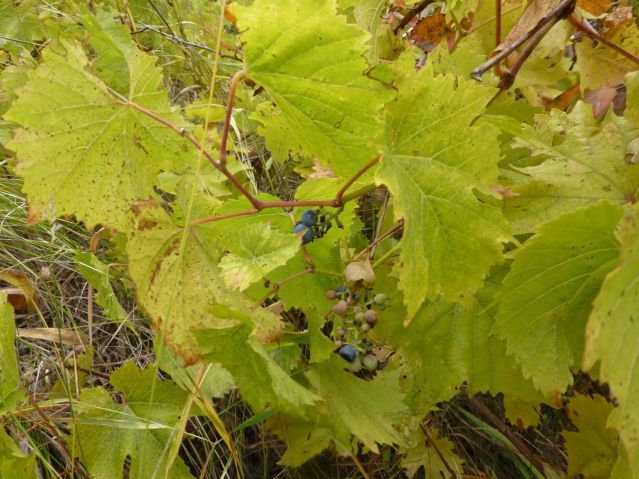

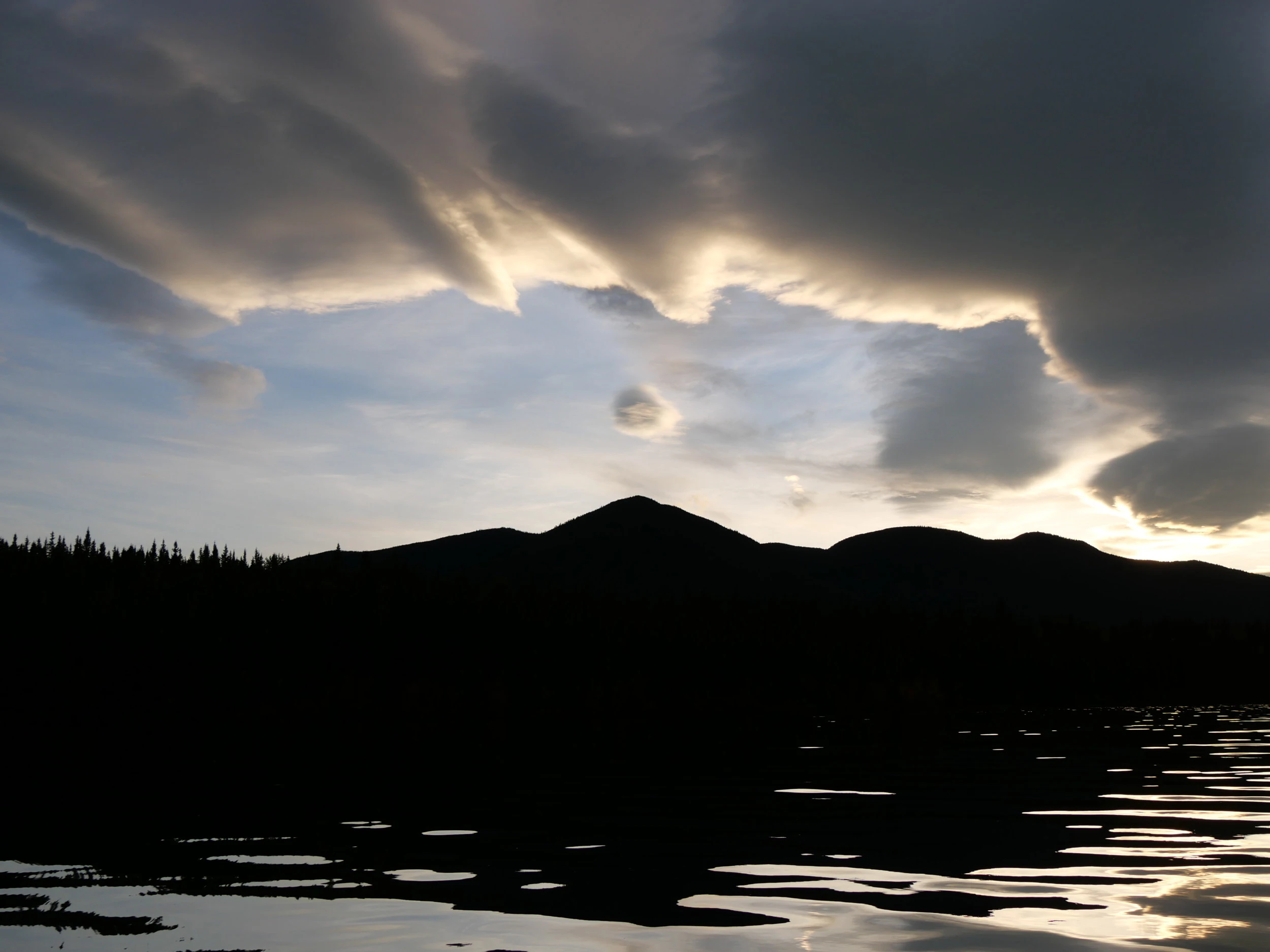
I was hoping you might experiment. Make some wine, including these wild grapes. Of course, it might be a disaster — the acids far too prominent. Or it might be very interesting. Do let us know, if you ever try.
As an aside, wild grape leaves are excellent stuffed with rice mixtures — minced lamb, perhaps; currants; pine nuts; lots of mint.
LikeLike
An intriguing idea. Let’s try that next year. This year I want to see what they do on their own, so I can understand the process of fermentation in its full wild state. I’ll keep you posted.
(There is only one vine. Patience is key.)
I did make some excellent wine from the grapes on my back fence, though. Come on over before it’s all gone!
LikeLike
Now if I lived anywhere close to the Okanagan, Harold, you might be sorry for that invitation! As I live in Toronto, all I can say is — enjoy. But save some for Christmas!
LikeLike
For Christmas I have a bottle of Riesling from Hattenheim and another from Oregon. Only the best will do.
But for the other winter days and nights, yes I have some put away.
LikeLike